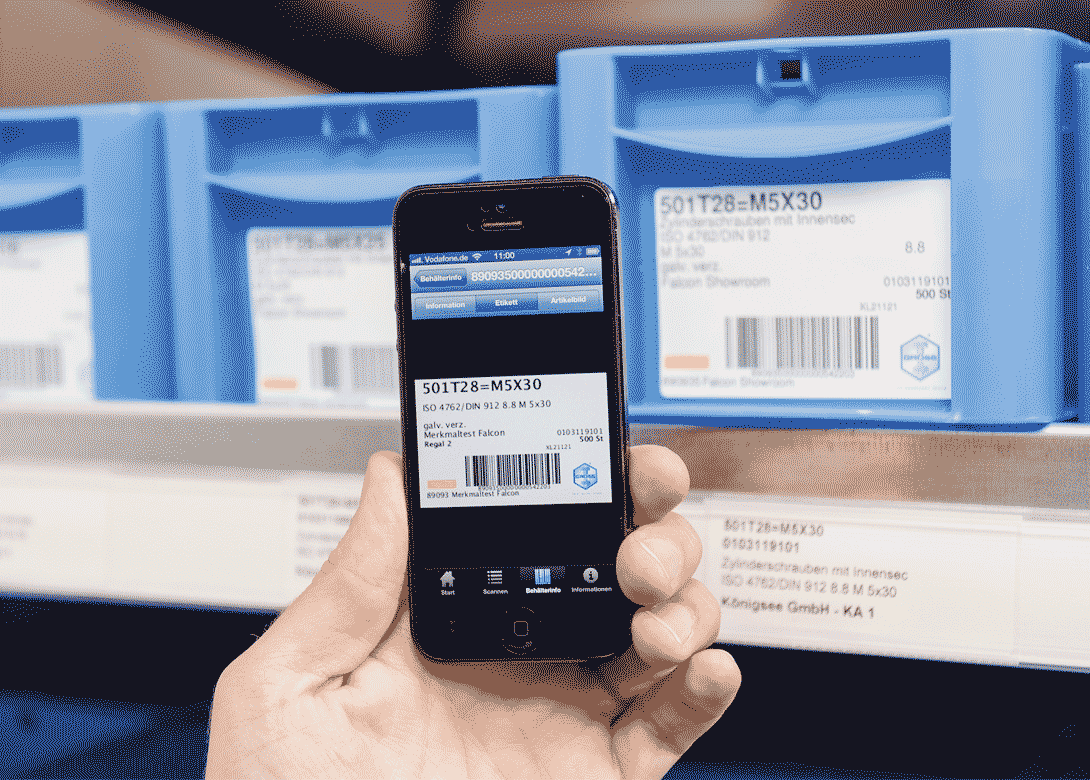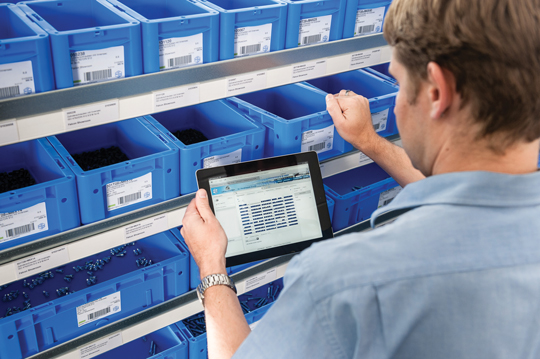Making products more readily available
25 July 2017
‘Digitisation’, ‘Internet of Things’, ‘Industry 4.0’ – even C-parts procurement is subject to advanced automation. With its browser-based FALCON software, the fastening technology specialist Ferdinand Gross GmbH & Co KG has a powerful tool in the portfolio that communicates in two directions.
Every buyer knows that C-parts are cost drivers. The parts, often delivered as bulk goods, are at the very end of the industrial food chain. They only represent about 15% of the purchasing volume but they account for 85% of the costs. Therefore, it is all the more important to automate the material flow as far as possible. Digitisation can be a great help here as it replaces analogous systems. Stationary devices are increasingly making way for smartphones and tablets.
In C-parts management, the Kanban system is still state of the art. It is a system for controlling material flow and production using the ‘pull principle’. Therefore, so-called self-controlling Kanban control loops are used to ensure the supply of material. Material supply in Kanban is exclusively based on consumption in the production process. As a rule, C-parts are stored in at least two containers per article on a Kanban shelf at the customer’s premises in production, logistics or material management. Replenishment control can be carried out automatically via RFID technology. The shelf is fitted by Ferdinand Gross as a C-part partner in a defined cycle. RFID is, in simple terms, a non-contact communication technology that transmits information for the identification of objects and is considered one of the cornerstones of the ‘Internet of Things’. Its goal is to reduce the information gap between the real and virtual world.
Ferdinand Gross RFID-KANBAN also supports the customer with C-parts management greatly in this respect. For example, if the company uses RFID mats for shelves, the worker simply places the empty Kanban container on this special RFID shelf. As a result, the ordering process is automatically triggered by radio and the order is confirmed by an audio and light signal. “This solution can easily be integrated into existing Kanban systems,” explains Thomas Erb, managing director of Ferdinand Gross. The delivery time of the order is also individually configurable. “Whether once per hour, every four hours or just once a day – our system can be customised according to customer requirements,” says Thomas Erb.
One step further towards Industry 4.0 is FALCON, the revolutionary Kanban visualisation tool by Ferdinand Gross. Persons, machinery, equipment, logistics and products communicate and cooperate directly in Industry 4.0.
The Ferdinand Gross RFID-KANBAN – with the browser-based software FALCON – gives the customer the visual access to all Kanban shelves within the company. FALCON’s virtual cockpit serves as a central control unit and presents the individual shelves and boxes in a visually appealing manner – also in 3D. The contents of the boxes, the respective delivery quantity, the assembly – everything. With the browser-based software, the storage location can be changed, the filling volume of a container can be changed or additional items can be ordered – all intuitively from a PC, smartphone or tablet. Thus, FALCON communicates in two directions. “Combining Ferdinand Gross RFID-KANBAN with FALCON will raise C-parts management to a whole new level and offer absolute transparency”, says Ralph Wittum, sales manager at Ferdinand Gross. “Nobody else has that.” FALCON is not only limited to RFID-KANBAN, it also works with all ordering systems from Ferdinand Gross.
FALCON can also do much more. As well as a powerful search function, the program offers numerous interfaces – for example, exporting to Microsoft® Excel lists. An EDI interface is also implemented, which guarantees the electronic exchange of business documents (order, delivery note, etc) in the form of structured data without manual intervention. Another benefit for the customer is that with EDI, the data transfer is accelerated several times, because the data at the receiver is immediately ready for further processing in the system. The elimination of monotonous, time and labour intensive manual data entry not only means less chance of errors but also better control, which makes the processes even leaner. In addition, the time of the data transmission itself is shortened, since the systems communicate directly with each other. Furthermore, numerous paper documents, such as orders, confirmations, invoices or delivery notes are not required.
“Thanks to FALCON, products are therefore becoming more and more available, processes becoming more efficient, communication is becoming ever more intense and data more transparent – irrespective of time or place.”


